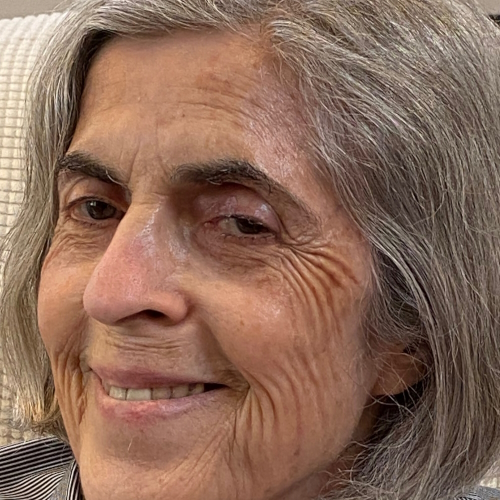VENCLEXTA® (venetoclax) Side Effects- Described by Real Patients
Before starting a new treatment, many patients have similar questions about side effects, effectiveness, and risks of the treatment. In this article, real cancer patients describe their experiences and side effects of venetoclax (VENCLEXTA) to help give you a deeper understanding of the targeted therapy.
Venetoclax is a type of targeted therapy that helps kill cancer cells by blocking the action of a protein (BCL-2) that helps cancer cells survive. The treatment was the first selective BCL-2 inhibitor to be approved for routine clinical practice in chronic lymphatic leukemia (CLL) and acute myeloid leukemia (AML) patients. Venetoclax can also be used to treat certain types of small lymphocytic lymphoma (SLL).
At The Patient Story, we understand the challenges you may be facing, and we’re here to offer guidance and empathy every step of the way.
What is a BCL-2 inhibitor?
BCL-2 proteins promote cell survival, even those that were supposed to die. As a BCL-2 inhibitor, venetoclax targets the cells that were supposed to die but didn’t. It essentially tells those cells to die.
“Venetoclax blocks a protein and turns a death signal back on in the cells, triggering apoptosis,” says leukemia and lymphoma specialist Dr. Tim Fenske. “That’s just a fancy term for programmed cell death. It restores the cell’s ability to die.”
A BH3-mimetic, venetoclax blocks the anti-apoptotic B-cell BCL-2 protein, leading to the programmed death of CLL cells.

“Get it diagnosed. Get it taken care of. Get the right doctor. Make sure you’re on the right regiment that you’re comfortable with. The ibrutinib and venetoclax is the gold standard right now, so if you don’t have a doctor that is going to at least explore that, find someone else. It’s a wonder cocktail. It’s absolutely amazing.”
Sean R. | See Sean’s Chronic Lymphatic Leukemia Story.
How and when is venetoclax used?
Venetoclax comes as a tablet taken by mouth and can be used alone or in combination with obinutuzumab or rituximab to treat certain types of CLL or SLL.
It can also be used as a first treatment for AML in people 75 and older when used in combination with azacitidine, decitabine, or cytarabine. This combination can also be used in adults who have medical conditions that prevent them from receiving other chemotherapy treatments.
Patients receiving treatment for CLL or SLL will begin with 20mg of venetoclax a day. That dose will be increased each week for five weeks, but will usually not be more than 400 mg a day.
In treatment for AML, patients will first start with 100mg of venetoclax a day. That dosage will gradually be increased weekly. The dose is usually no more than 400mg a day when taken in combination with azacitidine or decitabine, and no more than 600mg a day when taken in combination with cytarabine.
A specialist’s perspective
Kerry Rogers, MD, a hematologist and associate professor who specializes in CLL at The James Cancer Center at Ohio State University. She explained that oral treatments are the new name of the game and that venetoclax has proven to be very effective.

“I like to say that about a decade and a half before this kind of chemotherapy or chemoimmunotherapy, which is chemotherapy with an antibody works really well,” says Dr. Rogers. “The last decade and a half have been all about targeted agents. We actually no longer use chemotherapy to treat CLL. We do use it to treat other lymphoma successfully, but the whole name of the game is oral targeted agents and these are drugs that interfere with proteins in the CLL cells that make them behave like cancer cells.
The two main classes of drugs are something called BTK inhibitors and venetoclax, and they are extremely successful with virtually everyone achieving a remission, and just work very well.
The field is currently looking at newer generation agents of these different dosing schemes or different combinations to try to make treatment more effective but also easier to do for people and to have fewer side effects.”
What to expect when taking venetoclax
Whether you’re taking venetoclax on its own or in combination with other treatments, there are side effects that can be expected. Keep your care team aware of your side effects so they can help manage them, especially if they hinder activities of daily living and/or don’t go away over time.

Most common side patient side effects and complications
Tumor lysis syndrome (TLS)- Venetoclax can cause TLS at the start of treatment. All of the CLL cells die quickly and toxins can be released into the bloodstream. TLS is treatable, but it can be life-threatening if not treated.
“They [patients] have to come for at least two days in a row for blood tests or monitor tumor lysis syndrome every time,” Dr. Rogers says. “With this monitoring scheme, it’s very safe, and people developing tumor lysis syndrome can get that treated usually with medications. Things seem to go very well for people, but it’s a lot of hassle to do that. To protect people from tumor lysis syndrome, they have to stay hydrated. People who have heart failure, take diuretics or have kidney impairment, which could make tumor lysis syndrome more common and more dangerous, might not want to go down this path because that’s a greater risk to their health.”
Fatigue – As with many treatments, fatigue is a common side effect of venetoclax.
“The venetoclax hasn’t caused any side effects that we know if. I’m still battling the fatigue. The biggest thing that might possibly be attributed to the venetoclax is that I’ve gotten three sinus infections since I started. That’s out of the norm for me.”
Lacey B. | See Lacey’s Chronic Lymphocytic Leukemia Story

Most patients handle venetoclax very well and it has no known cardiovascular risks or bleeding risks. It does still have some risks of gastrointestinal side effects like diarrhea or nausea, according to Dr. Matthew Davids of Dana-Farber Cancer Institute.
Complications
Low white blood cell count – Low white blood cell counts are common with venetoclax, but can also be severe, according to the Mayo Clinic.
Infections – Serious infections like pneumonia and blood infections can occur during treatment with venetoclax, the Mayo Clinic says. Tell your doctor if you have a fever or any signs of an infection.
Before starting venetoclax
Before starting treatment with venetoclax, it is important to tell your doctor about all of your medical conditions including:
- Kidney or liver problems
- Issues with potassium, phosphorus, or calcium
- A history of high uric acid levels in your blood or gout
- Recent or upcoming vaccinations
- You are pregnant, nursing, or could become pregnant
- All current medications including over-the-counter vitamins and/or supplements
- Other medical conditions
More Venetoclax Stories
Tamsin W.
1st symptoms: Out of breath, dizzy, nauseated, tiredness, palpitations
Treatment: Obinutuzumab & venetoclax
...
Susan K.
Symptoms: Swollen lymph nodes on the neck, high white blood count
Treatment: Venetoclax & obinutuzumab
...
Sean R.
1st symptoms: No apparent symptoms; went to ER for unrelated shoulder pain
Treatment: Clinical trial, Ibrutinib & Venetoclax
...
Mary Clare B., Acute Myeloid Leukemia (AML)
Cancer details: Relapsed but in remission after 2nd transplant
1st symptoms: Extreme fatigue, upset stomach, bad & persistent headaches
Treatment: Chemotherapy, radiation, 2 bone marrow transplants
...
Laura E.
Symptom: Increasing back pain
Treatments: Chemotherapy, stem cell transplant, bispecific antibodies
...
Tim Fenske, MD, MS
Role: Hematologist-Oncologist
Focus: chronic lymphocytic leukemia (CLL) & leukemia and lymphoma | CAR T, targeted therapy
Provider: Medical College of Wisconsin
...
Jacqueline Barrientos, MD
Role: Hematologist, researcher
Focus: Chronic lymphocytic leukemia (CLL), lymphoma, 17p Deletion (Ibrutinib, Acalabrutinib, Venetoclax), IgHV mutation
Provider: Northwell Health (NYC)
...







